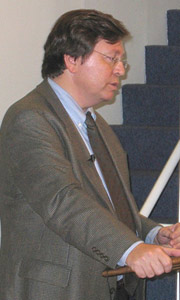In a Climate Defined by Money, Charles Lewis Digs into Politicians' Pockets
![]()
 In a speech at NYU, Charles Lewis, founder of the Center for Public Integrity, discussed the ins and outs of money in politics.
In a speech at NYU, Charles Lewis, founder of the Center for Public Integrity, discussed the ins and outs of money in politics.
Photo: Christy Boldenow
Political fund-raising for the 2004 election has far eclipsed past efforts, making this year’s race the most heavily financed in U.S. history. In fact, by July President George W. Bush and Senator John Kerry had already spent more on television advertisements than all other presidential candidates in history combined. Including the war chests of congressional candidates, the total sum of money spent and raised this election cycle will likely surpass the $3 billion mark. And as Charles Lewis noted in a talk at New York University last week, “Bush has raised more money than any other man on earth.”
And Lewis would know. In 1989, he founded the Center for Public Integrity, a nonpartisan, non-profit organization that studies policy issues and campaign financing. The center, according to Lewis, covers “the backdoor of American politics,” specifically with regard to the circulation of money.
Before founding the Center, Lewis held a production position for 60 Minutes, but found that the job was not for him. He resigned at 35. “I felt like I had to take a shower after meeting the characters we were interviewing,” he said. With the Center, he aims to “do pure investigative journalism.”
Thanks to its impressive team of journalists around the world, Lewis’s group moves tens of thousands of documents a year. Since its inception, the center has released more than 230 investigative reports and 12 books. Three of those books are from the The Buying of the President series, which has been examining the relationships between presidential candidates and their campaign donors since 1996. Quite significantly, the books of the series are the only investigative profiles published before the first caucuses and primaries.
Of course, the information is not easy to track down. The project is expensive and labor-intensive, according to Lewis. “There’s a reason they say this is a non-profit group,” he said. For The Buying of the President 2004, the center’s staff conducted over 600 interviews (including sessions with Sen. John McCain and former president Jimmy Carter).
What the center’s investigations have found, repeatedly, is that most contributors do not just throw in a few dollars. They throw in millions and often do it for their own benefit. Using Sen. Bob Dole as an example, Lewis discussed the campaign contributions of a winery in California, which gave heavily to Dole’s coffers. “Now, there are no grapes in Kansas,” said Lewis, but the Gallo Winery “wanted to pass millions of dollars in tax breaks to their grandkids,” and they wanted the powerful senator to help them. By passing the Gallo Amendment, Dole did exactly that.
Of course, the money pouring into the Bush and Kerry camps has strings attached as well. According to Lewis, both candidates have received contributions from big law firms, banks, and telecommunications companies—all of which take their own interests into consideration before offering financial support.
Like many concerned about the influence of money on politics, Lewis argues that 527 political action committees should be more strictly regulated. More problematic to him, however, are 501(c)(3)s—legally designated nonprofit organizations. While 527s must disclose who is running them, 501(c)(3)s are under no such pressure. As a result, “mysterious groups pop up,” said Lewis, and “that scares the hell out of me.” Lewis argues that little can be done to stop people from creating such organizations, so they must be regulated and required to make more information public.
But of course, politicians and political groups often go to great lengths to keep information to themselves, making even regulation quite a serious challenge. For example, in the center’s campaign financing investigations, Lewis said politicians often give his reporters the runaround regarding donors by sending writers to the Federal Elections Commission or just blowing them off.
Lewis singled out the Bush White House as particularly prone to secrecy, calling it “the most restrictive administration since Richard Nixon.” But his criticism extends far beyond the current administration: “All politicians who are in office for more than ten minutes get corrupted,” which gives the Center plenty of work to do. In the current political system, Lewis said, “An eagle scout would get mud on them.”
Christy Boldenow can be reached at .
![]()
